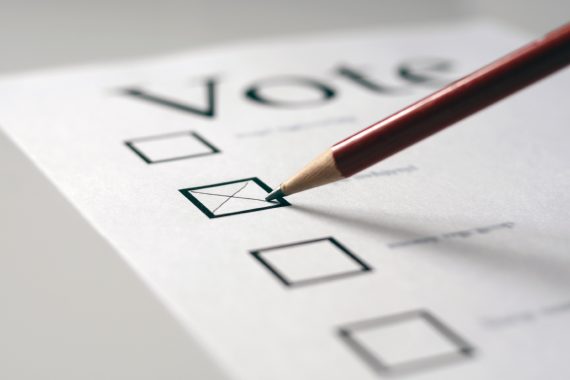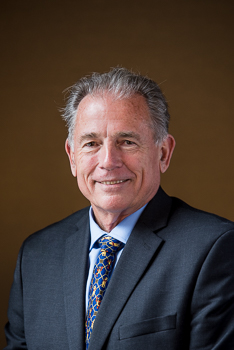
(-6-1-2017) The President of the National Alliance on Mental Illness Board of Directors sent an email yesterday to the organization’s state and local leaders about NAMI’s upcoming board elections that one candidate is calling “fairly unconscionable.”
Without mentioning any candidates by name, President Steve Pitman (shown in NAMI photo) wrote that the selection of five new board members will determine NAMI’s future for the next three years:
At issue will be whether we continue to build broad coalitions that allow for discussions of subjects like serious mental illness (SMI), hopefulness, recovery, stigma, etc. This is the “big tent” approach that embraces “all” in the conversation. In the alternative, NAMI would narrow its focus to that of serious mental illness in a much “smaller tent.”
The issue is one of strategy. How does NAMI best build support for the issues surrounding SMI? If one looks at the history of NAMI, this movement to a big tent approach has been slow and steady. Through the years, the duly-elected boards of NAMI, with many different members, have supported this broadened focus. The question now before our affiliates and state organizations is whether this big tent approach has helped to make the needed changes affecting those living with SMI and their families? Going forward, what is the more effective strategy: big tent or small tent?
The email, which I have included in its entirety at the bottom of this post, was read by candidates, who are campaigning on a “Focus on Serious Mental Illness” platform, as an attempt to sway the election against them. Four candidates have said that NAMI needs to focus more on SMIs, which include schizophrenia, bipolar disorder, and severe and persistent depression, rather than expanding its reach into other diagnoses.
One of the candidates on the SMI platform, D. J. Jaffe, sent me an email complaining about Pitman’s action.
The NAMI board president, in spite of an obligation to remain neutral sent an email to all affiliates and state organizations couching the election as being for or against the Focus in Serious Mental Illness ticket versus for or against say , stigma, which others are campaigning on. This is fairly unconscionable. This went out at same time ballots went out to affiliates and state orgs.
In an email, I asked President Pitman if he wanted to explain his reason for sending his email. He said that he had nothing more to add to his originial email. It was distributed nationally by NAMI’s headquarters and Pitman wrote it as board president, which would suggest that NAMI’s current 16 member board and NAMI’s executive director, Mary Giliberti, agreed with Pittman’s statement.
The four candidates running on a Focus on Serious Mental Illness platform are:
- D.J. Jaffe, Nominated by NAMI of Buffalo & Erie County (New York State)
- Robert S. Laitman, M.D., Nominated by NAMI of Westchester County (New York State)
- Mary Zdanowicz, Nominated by NAMI Cape Cod & the Islands (Massachusetts)
- Lauren Rettagliata, Nominated by NAMI Contra Costa County (California)
In seeking one of the five board seats that need to be filled, Jaffe explained the group’s platform.
“We want NAMI to return to a focus on the four percent with serious mental illness, versus the eighteen percent of adults with any mental illness. In other words, we believe we should focus on the eleven million who are the most seriously ill versus the forty-three million with a wide range of ‘conditions’ that NAMI now claims to represent even though there are scores of other organizations advocating for them.”
There has been a long simmering rift in NAMI about whether it should focus on SMIs exclusively or expand its reach. A sign of the ‘big tent” thinking can be seen in NAMI’s headquarter’s decision to replace the words “Mental Illnesses” with “Mental Health Conditions” on its website. The DSM-5 includes nearly 300 mental health diagnoses including restless leg syndrome and sleep apnea. Jaffe claims that many of the diagnoses that NAMI has expanded into, such as Autism, eating disorders, and ADHD, already have national organizations that focus entirely on improving services for their members who have those diagnoses. NAMI’s original founders focused exclusively SMIs. Others argue that bringing in other diagnoses helps NAMI gain members and have a bigger impact in Washington D.C. because it can join forces with other groups.
Votes will be officially cast ballots on Friday, June 30th, at NAMI’s national convention in Washington D.C., but the real voting is underway, which is why Jaffe and others on the SMI platform are upset by Pitman’s email. His email reportedly was distributed at the same time as the official ballots.
Individual NAMI members do not cast ballots at the convention. Rather, they are supposed to let their local NAMI affiliate know who are their favorite candidates. The affiliates then send a certified representative to the convention to cast ballots.
The day before the vote – Thursday, June 29th, — convention attendees will be able to pose questions to the current board during an open mic session held between 3 p.m. until 4:30 p.m.
Here is a copy of Pitman’s email.
Dear NAMI State Organization and Affiliate Leaders,
In late May and June, NAMI Affiliates and State Organizations have the opportunity to elect five members to the 2017-18 NAMI Board. The 2017 candidates you select will influence the direction of NAMI for the next three years. The “voice” of affiliates and state organizations will be heard in the results of this election.
At issue will be whether we continue to build broad coalitions that allow for discussions of subjects like serious mental illness (SMI), hopefulness, recovery, stigma, etc. This is the “big tent” approach that embraces “all” in the conversation. In the alternative, NAMI would narrow its focus to that of serious mental illness in a much “smaller tent.”
The issue is one of strategy. How does NAMI best build support for the issues surrounding SMI? If one looks at the history of NAMI, this movement to a big tent approach has been slow and steady. Through the years, the duly-elected boards of NAMI, with many different members, have supported this broadened focus. The question now before our affiliates and state organizations is whether this big tent approach has helped to make the needed changes affecting those living with SMI and their families? Going forward, what is the more effective strategy: big tent or small tent?
The worst possible outcome of the upcoming election would be that anyone would be elected without a strong majority of affiliates and state organizations casting their votes.
NAMI needs your voice to set clear direction for moving forward. Each of our affiliates and state organization must be a part of defining that direction.
In 2017, we should all understand the importance of voting and the consequences of not voting.
Please vote! NAMI needs to hear your voice!
Check this out for more information on the candidates and the election process
Review this for a walk through of the online voting system
Direct any questions you may have to voting@nami.org
Thank you for all you do in service of the NAMI mission.
Sincerely,
Steve Pitman, President
NAMI Board of Directors President
Here is a list of all of the candidate running for the five open seats.
- John Freeburg, Nominated by NAMI Washington State
- Robert S. Laitman, M.D., Nominated by NAMI of Westchester County (New York State)
- Lauren Rettagliata, Nominated by NAMI Contra Costa County (California)
- D.J. Jaffe, Nominated by NAMI of Buffalo & Erie County (New York State)
- Adrienne Kennedy, M.A., Nominated by NAMI Austin (Texas)
- Frankie Berger, Nominated by NAMI Central Virginia (Virginia)
- Jim Hayes, M.D., Nominated by NAMI South Carolina
- Terry Bridges, Nominated by NAMI Tennessee
- Mary Zdanowicz, Nominated by NAMI Cape Cod & the Islands (Massachusetts)
- Micah Pearson, Nominated by NAMI Doña Ana County (New Mexico)
- Chip (Emmett) Angell, Nominated by NAMI Portland (Maine)
- Nancy Carter, Nominated by NAMI Urban Los Angeles (California)
- Amanda Lipp, Nominated by NAMI California
- Jorge R. Petit, M.D., Nominated by NAMI New York City Metro (New York State)
- Christine L. Thompson, B.S.N., C.P.S., Nominated by NAMI Kansas
- Carlos Larrauri, R.N., B.S.N., Nominated by NAMI Miami-Dade County (Florida)
CORRECTION: IN AN EARLIER VERSION OF THIS BLOG, BOARD PRESIDENT PITMAN’S NAME WAS MISSPELLED. I APOLOGIZE FOR THE ERROR.




